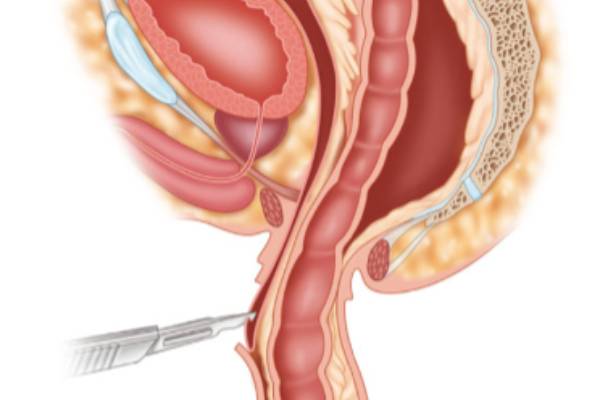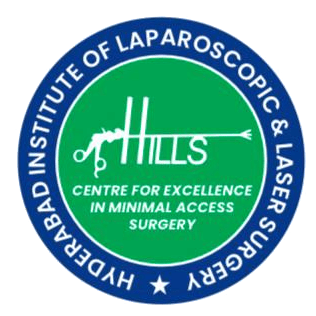Rectal prolapse is a condition where the rectum, which is the last part of the large intestine, protrudes from the anus. It can pass when the muscles and ligaments supporting the rectum weaken, allowing it to bulge or bag outside the body. Rectal prolapse primarily affects adults, with women aged 50 and older being six times more likely than men to develop this condition knowing this complaint can be disturbing and uncomfortable but it’s treatable. Dr. N. S. Babu is the best colorectal surgeon in Hyderabad who has successfully treated more than 10,000+patients and he provides expert guidance to patients for rectal prolapse treatment in Hyderabad.
Dr. N. S. Babu has 15+ experience in treating varied colorectal conditions and presently he’s consultant surgical gastroenterologist and advanced laparoscopic surgeon at EVOKE Clinics, Secunderabad, and Apollo Hospital, Hyderabad. Dr. N. S. Babu has won numerous awards at various prestigious transnational and public conferences, and he has been part of the world’s first randomized clinical trial on laparoscopic Vs open pancreatoduodenectomy, also he’s famed as the best surgical gastroenterologist in Hyderabad.

Types of rectal prolapse?
- Internal Rectal Prolapse( Rectal Intussusception) The rectum may turn inside out but does not pout through the anus.
- Mucosal Prolapse The inner stuffing of the rectum protrudes through the anus.
- Full- Thickness Prolapse The entire density of the rectum protrudes through the anus.
What are the signs or symptoms of rectal prolapse?
According to best colorectal surgeon in Hyderabad, Dr. N. S. Babu signs and symptoms of rectal prolapse can vary depending on the type and seriousness of the prolapse. Here are some common signs and symptom:
- A feeling of a bulge or swell from the anus
- Difficulty controlling bowel movements( fecal incontinence)
- Constipation or straining during bowel movements
- Bleeding from the rectum
- Mucus discharge from the rectum
- Redness, soreness, or itching around the anus
What causes rectal prolapse?
Rectal prolapse can be caused by a variety of factors, including:
- chronic constipation or straining during bowel movements.
- chronic diarrhea or conditions that increase abdominal pressure.
- Weakening of the pelvic bottom muscles, constantly associated with delivery or pelvic surgery.
- Neurological conditions affect the nerves controlling bowel movements.
- Genetics or family history of pelvic floor disorders.
- Previous rectal surgery or trauma to the pelvic area.
Dr. N. S. Babu provides best rectal prolapse treatment in Hyderabad, where he specific that rectal prolapse can also occur in children, often due to conditions that affect the muscles or nerves in the pelvic area.
Risk Factors of Rectal Prolapse:
Risk factors for rectal prolapse include:
- Age (more common in older adults)
- Chronic constipation or straining during bowel movements
- Chronic diarrhea or conditions that increase abdominal pressure
- Previous pelvic surgery
- Neurological conditions affecting the nerves controlling bowel movements
- Family history of pelvic floor disorders
- Female gender (more common in women)
Diagnosing & Treatment for Rectal Prolapse:
Diagnosing: Best surgical gastroenterologist in Hyderabad, Dr. N. Subrahmaneswara Babu would diagnose rectal prolapse based on the patient’s symptoms, medical history, and a physical examination. fresh tests similar as a colonoscopy or imaging studies may be done to estimate the extent of the prolapse and rule out other conditions.
Treatments options:
- Conservative Management: This may involve salutary changes to avoid constipation, pelvic floor exercises to strengthen muscles, and the use of dropping softeners to ease bowel movements.
- Manual Reduction: In some cases, a healthcare provider may manually push the rectum back into place, although this is typically a temporary solution.
- Medications: Medications similar to laxatives or coprolite mufflers may be specified to help manage symptoms and prevent constipation.
- Biofeedback Therapy: This therapy helps patients learn how to control their pelvic floor muscles and improve bowel function.
- Surgical Repair: Surgery may be recommended for severe or intermittent cases of rectal prolapse. There are varied surgical procedures available, including
- Rectopexy: This technique includes carefully getting the rectum in its generally expected position inside the pelvis.
- Resection: In some cases, a portion of the rectum may need to be removed.
- Perineal Methodology: Medical procedure might be performed through the perineum( the region between the butt and privates) to fix the prolapse.
The choice of treatment depends on the severity of the prolapse, the patient’s overall health, and their preferences. It’s important to discuss the options with a Dr. N. S. Babu to determine the most appropriate treatment plan.Dr. N. S. Babu has done treatment of various diseases such as piles, fistula , fissure and achalasia-cardia for the best care and effective treatment for the patients with suffering from this condtions.
Why Choose Dr. N. S. Babu for Rectal Prolapse Treatment in Hyderabad?
- Vast Experience: With a wealth of experience in Surgical Gastroenterology, General & Laparoscopic Surgery, and the treatment of rectal prolapse, Dr. N. S. Babu has successfully performed over 10,000 surgeries.
- Specialized Expertise: Dr. N. S. Babu specializes in a wide range of GI surgeries, including rectal prolapse condition, colorectal surgery, and complex procedures analogous as rectal prolapse surgery.
- Educational Accomplishments: Dr. N. S. Babu’s educational background includes a Master of Surgery, FMAS( Fellowship in Minimal Access Surgery), and DNB Surgical Gastroenterology, along with fellowships in HPB Surgery, demonstrating his commitment to staying abreast of medical advancements.
- Affiliation with Renowned Institutions: Presently practicing at EVOKE Clinics, Secunderabad, and Apollo Hospitals Hospital, Hyderabad, Dr. N. S. Babu is confederated with prestigious medical institutions, ensuring high- quality healthcare services.
- Member of Professional Associations: Dr. N. S. Babu is a full- time member of the Association of Surgeons of India( ASI) and the Association of Minimal Access Surgeons of India( AMASI), actively contributing to the advancement of surgical practices in professional communities.
Consult With the Best Colorectal Surgeon in Hyderabad:
- Are you in search of the best rectal prolapse treatment in Hyderabad? Look no further – Dr. N. Subrahmaneswara Babu is one of the best rectal prolapse surgeon in Hyderabad. For any information and appointment call us on 094908 08080 or simply fill out the form Book your appointment
Frequently Asked Questions (FAQ's):
What is the best treatment for rectal prolapse?
The best treatment for rectal prolapse depends on the severity of the condition and individual factors. In general, surgical options such as rectopexy or resection are often considered the most effective for severe cases, while lifestyle changes, pelvic floor exercises, and medications may be sufficient for mild cases.
How many hours is rectal prolapse surgery?
Rectal prolapse surgery typically takes about 2 to 4 hours, but the exact duration can vary depending on the specific procedure and the complexity of the case.
Can rectal prolapse recurs?
Yes, rectal prolapse can recur, especially if the underlying causes such as chronic constipation or weak pelvic floor muscles are not addressed.
Is surgery only treatment for rectal prolapse?
Rectal prolapse can be treated with options other than surgery, including lifestyle changes, exercises, medications, or biofeedback therapy. Surgery is typically considered for severe cases or when other treatments fail.
What foods heal rectal prolapse?
High-fiber foods like fruits, veggies, whole grains, and legumes can help heal rectal prolapse by preventing constipation and reducing straining. Drinking plenty of water keeps stools soft. Vitamin C-rich foods like citrus fruits, strawberries, and bell peppers promote tissue healing.
